What I Felt When My Child First Said, ‘I Love You’
February 16, 2025
February 16, 2025
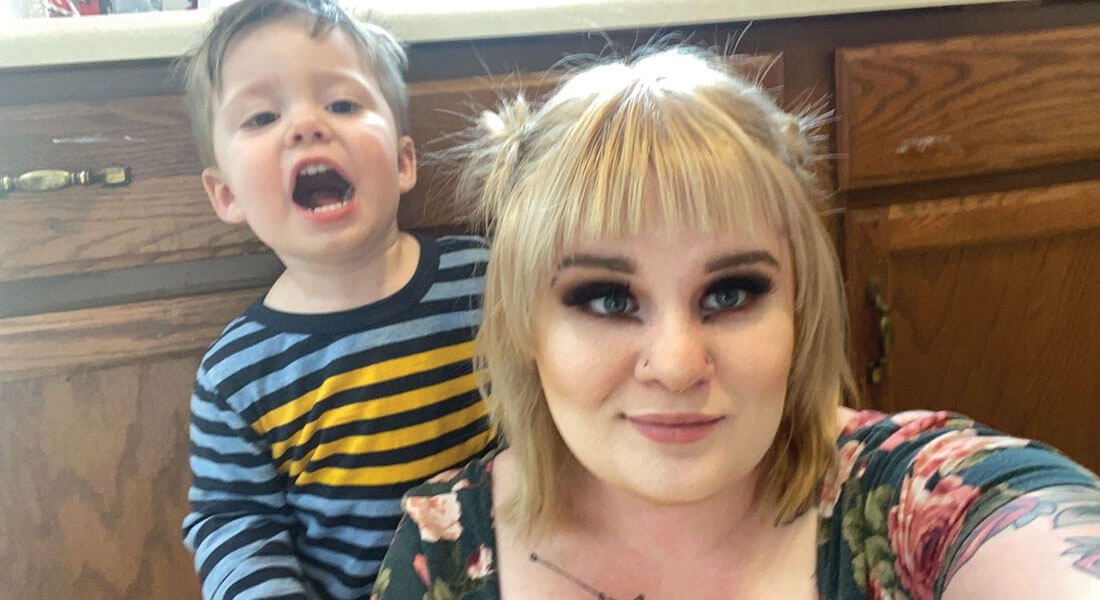
Do you remember the first time you heard someone special say, “I love you”? What did you feel? How did you respond? What was happening in that moment?
While our families at Hopebridge feel the love from their kiddos, some of them do not have the opportunity to hear it spoken out loud because their children are nonverbal or have social challenges related to autism spectrum disorder (ASD). These parents and caregivers experience affection in other meaningful ways, but the wish for more is often there.
That is why the verbal “I love you” moment was so exciting and heartwarming for the mother of one Hopebridge kiddo. At nearly 3 years old with a bit more than six months of autism therapy in our centers, young Isaac recently surprised his mom with the phrase every parent yearns to hear.
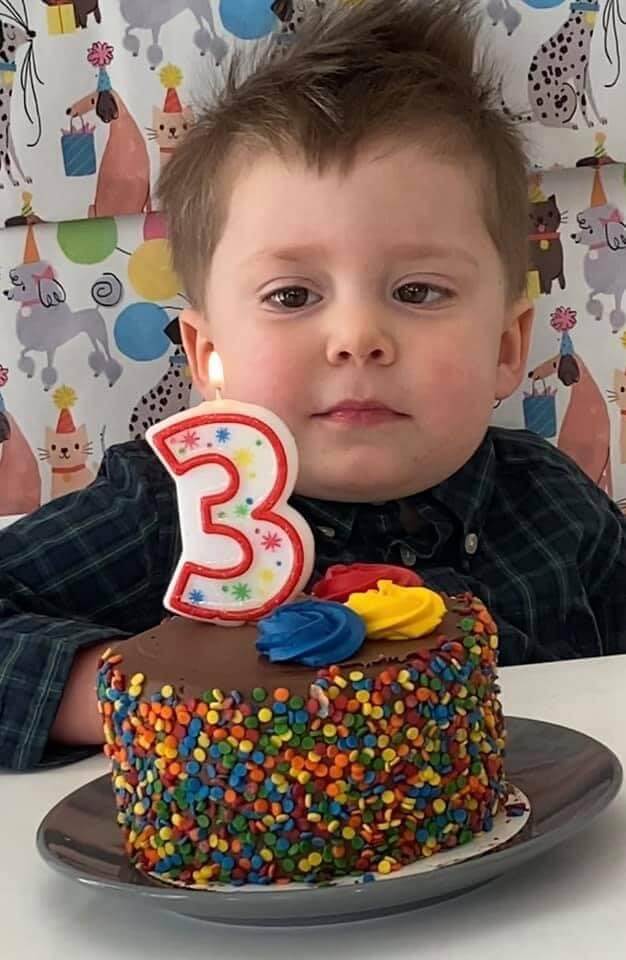
His mom, Kancise, was buckling him in the car seat, gave him a kiss on the cheek and told him, “I love you,” just as she would every day. This time, however, he responded with “ah uh ooo” which clearly sounded like he was trying to repeat what she had said to him.
She instantly snapped her head to look at him! She originally thought she imagined it, but she looked at her boyfriend, who immediately said, “did you hear that?”
Kancise practically jumped for joy, crying the happiest tears as she whipped back open the door to shower her son with tons more kisses and show him all her love.
“I was bawling. He could tell what a big deal this was, as he had the biggest smile on his face after noticing my excitement,” said Kancise.
She couldn’t wait to share the news with her own mother as they were on the way to her house. Once they arrived and she heard about the special moment, Isaac’s grandma began to cry, too.
They both worked in an attempt to hear him say it again, and while he didn’t repeat it again that day, it does not take away what a wonderful gift the moment was for Kancise.
Isaac is a smart kiddo, which his mom tells us is the first thing people notice about him. Even before he turned 2 years old, he could lay out all the letters in the alphabet and now he can do it backwards. He can also successfully piece together 500-piece puzzles in a half-hour, knows all of his body parts, and has memorized every syllable in many of his books. Like most other children his age, he adores everything related to “Baby Shark” and Dr. Seuss.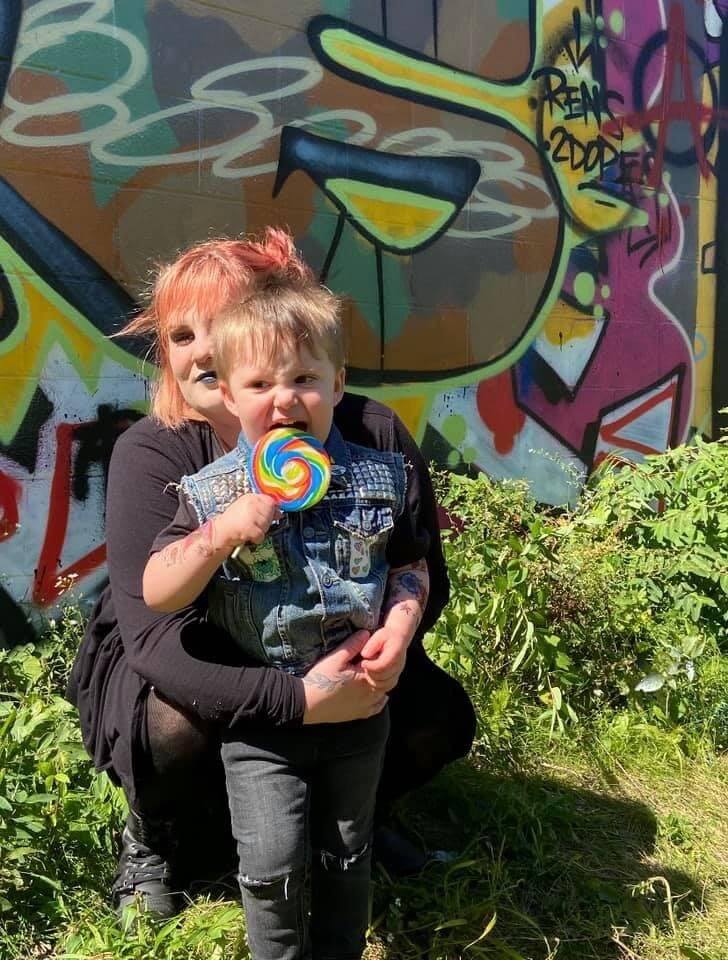
Kancise tells us that when Isaac began therapy at Hopebridge’s center in Miamisburg, Ohio, he was completely nonverbal and struggled with apraxia, a motor speech disorder that makes it difficult to speak.
“He didn’t talk at the time. Some gibberish, but other than that—nothing. He already had an autism diagnosis and had previously participated in speech and occupational therapy, but still wasn’t saying anything,” said Kancise.
Isaac’s parents met with his therapy team to set goals focused around talking. Since beginning a personalized, interdisciplinary program of applied behavior analysis (ABA therapy), speech therapy and occupational therapy at Hopebridge, Isaac has broadened his communication skills.
To get to this point, Isaac’s therapy team collaborated to incorporate the Picture Exchange Communication System (PECS) into his program of care. Once he was comfortable with this tool, they began teaching him sounds, working with him on imitating words, and eventually making verbal requests.
“Within weeks of starting at Hopebridge, Isaac started saying ‘mama’ and other small words,” said Kancise. “His words get a little mumbled so it’s more difficult for him, but people familiar with him can now understand 20-30% of what he says.”
Kancise told us they were not specifically working on the phrase, “I love you,” at the time he said it, which made it even more surprising. He likely heard her say it so many times a day until he was ready to repeat it. Isaac has verbalized it one more time since he originally said it to his mom, and she looks forward to hearing it more.
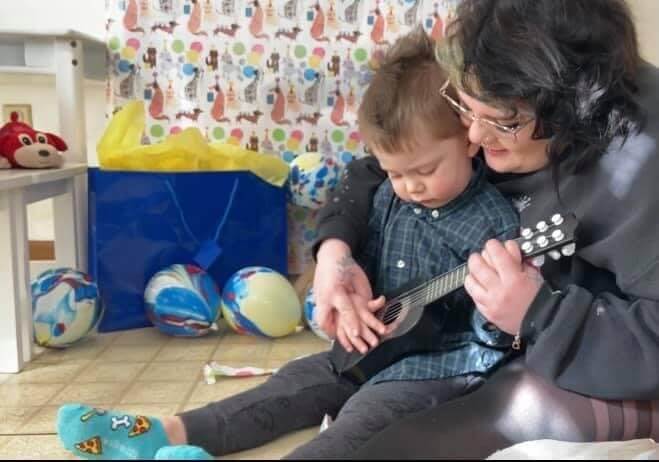
In addition to progressing in his speech and vocalization, Isaac has flourished in socialization and other areas of behavior.
His mother told us he used to experience temper tantrums often, likely due to possible sensory sensitivities and communication frustrations. Isaac’s cousin, who is the same age, lives with them while his mother serves in the military, and Isaac originally had trouble handling any noise he made. Since attending therapy at the center, the two get along better at home and Isaac has learned to walk away to calm down, when needed.
“One of the biggest things since coming to Hopebridge is that Isaac has opened up to so many more people. He always had a lot of people in his life, but really only connected with me, my mom and his dad,” said Kancise.
She told us he didn’t want anything to do with others and didn’t make eye contact. Now he participates in social interactions, makes eye contact and engages in play with others. His therapy team taught him to play with baby dolls and he loves to cover them with blankets and feed them bottles. Kancise expressed how happy she is to see how loving and caring he is now.
It’s been one year since that first “I love you,” but if you met Isaac now, you’d never know he began talking less than two years ago.
Now 4 years old, we recently chatted with his mom to get the scoop on a very exciting update—Isaac graduated from ABA therapy at Hopebridge!
Isaac started preschool in August; bridging the transition to school by continuing to attend ABA at Hopebridge until January. He enjoys school – A.K.A. his “teacher’s house” to Isaac – and constantly asks to play with his friends.
“He talks my ear off now. He can count well beyond 100 and can read anything. He’ll see a random phrase or sign and read it. He would even read the name on the side of the school bus,” said Kancise. “He said ‘Franklin City Transportation. School bus, please?’ so he now rides the bus to school each day and loves it.”
Kancise told us his therapy team originally suggested he graduate from ABA therapy in October, but Kancise was expecting a new baby and opted to keep him in a bit longer because of the changes in routine. The result has been a smooth transition.
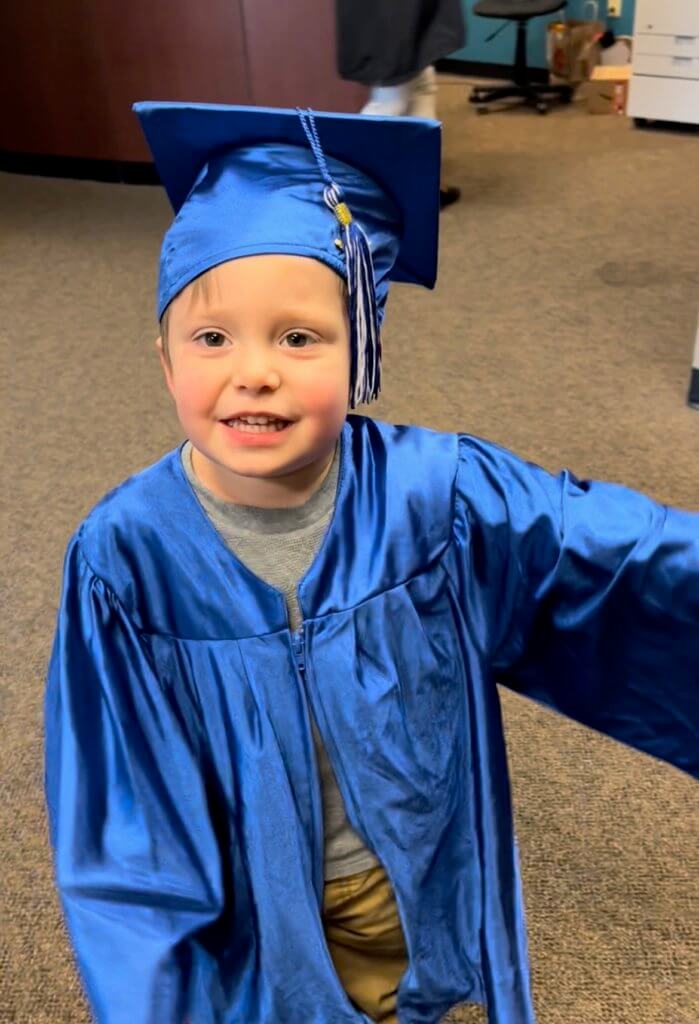
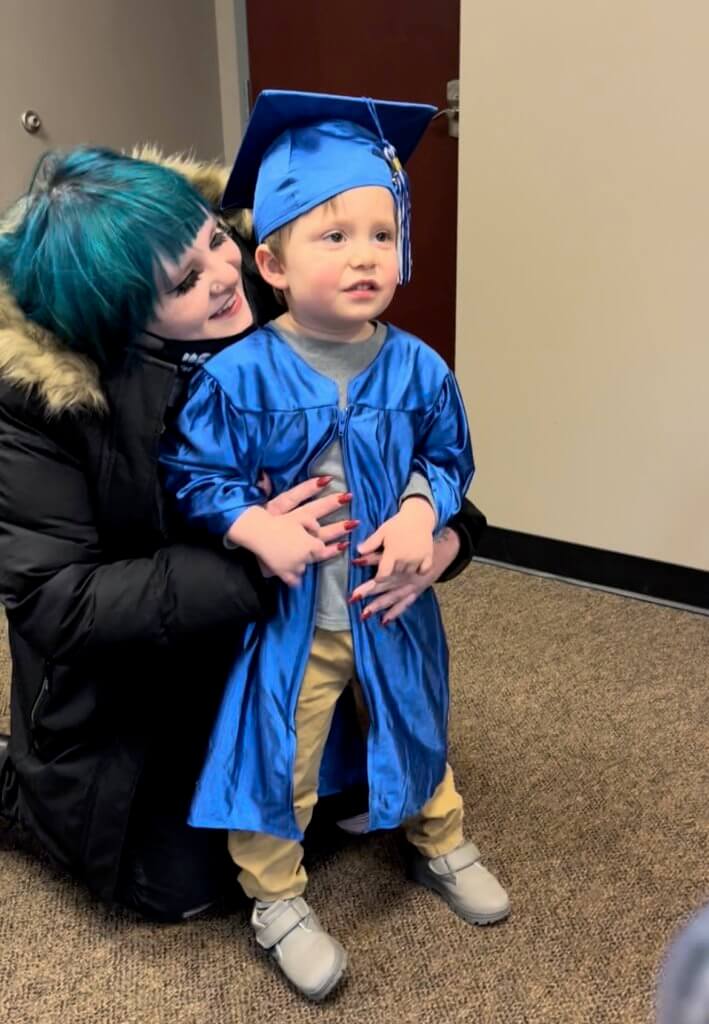
The “big brother” title is suiting Isaac well, too. His mother told us he loves his baby brother, Devin, and is so helpful with him around the house. He will say, “It’s ok, Devin,” to calm him, and has asked his mom, “I take Devin to school, see friends?” Beyond being his brother’s biggest fan, Isaac loves doing huge puzzles, building with Legos and painting. He can identify any dinosaur put in front of him and recently celebrated his birthday with a dino-themed cake and party décor.
Isaac has progressed immensely since his first days at Hopebridge. He still has some challenges with pronunciation, so although Isaac is no longer attending ABA therapy, he still participates in speech therapy for 30 minutes twice a week at the center. Kancise also mentioned that she feels good knowing that ABA is still available to him through the spring should he regress at all.
“Isaac’s time with Hopebridge has been great. His RBT, Jhanae, is awesome. She helped him so much. Originally, he didn’t want to get up in the morning, but once he started seeing Jhanae, he became obsessed with her and wanted to go every day. Even now, he’ll sometimes say to me, ‘I go Jhanae?’”
We recently had the chance to catch up with Isaac and his mom, Kancise, to hear all about life since ABA therapy at Hopebridge. And guess what? Isaac joined us on the call, ready to chat and show off his incredible progress!
Now 7 years old and in first grade, Isaac is thriving. He enthusiastically told us about school, where he’s loving hands-on learning at a small private academy. His favorite part? Recess, of course! But his mom says he’s also a big fan of science—so much so that he’s in a STEAM Club and loves picking out science kits at Hobby Lobby. He even has big dreams for the future, saying he wants to be a doctor, a teacher, and a dad!
Isaac’s talents have continued to shine. His parents discovered his reading skills when he was just 3 years old at a holiday light display—he read a sign aloud before they even realized what he was doing!
Since then, he’s tackled books like Diary of a Wimpy Kid and impresses everyone with his love for learning. As a toddler, he was already solving 300-piece puzzles and counting train cars with incredible accuracy. Now, he’s channeling that same energy into school and extracurriculars.
As part of his school day, Isaac also participates in speech therapy. He started kindergarten with a behavioral IEP to help with attention, but now only requires support for speech—a huge milestone!
His transition from ABA to full-time school wasn’t without its uncertainties, though. Kancise recalls feeling nervous about how he would adjust without one-on-one support.
“At Hopebridge, he had a one-on-one adult with him the whole time, and I knew in kindergarten he wouldn’t have that added support around so many other kids,” said Kancise. “I was nervous, but I am so glad we did it. Soon after is when he started really talking!”

Now, Isaac is chatting up a storm—not just with his classmates, but also with his little brother, Devin, who just turned 3. Seeing the two of them engage in full conversations is especially meaningful for Kancise, who remembers when Isaac mostly mirrored sounds and relied on scripted phrases. She believes his drive to connect with other kids helped him break through those patterns and build real communication skills.
For families on a similar journey, Kancise has some heartfelt advice:
“If you feel like something is different, or you have concerns about speech or behavior, it’s probably for a reason. Get support and don’t let anyone shut you down and tell you it’s not important,” she said.
“Early intervention makes a huge difference. Isaac was diagnosed with autism one week after his 2nd birthday. If he wasn’t and didn’t have the chance to get into ABA, our lives would be very different right now.”
Looking at Isaac today, it’s clear how far he’s come. From ABA graduate to thriving first grader, his story is a testament to the power of early intervention, dedicated support, and a family that never stopped believing in his potential.
Does your child have challenges with communication or socialization? If you think your child could benefit from Hopebridge’s multidisciplinary care, contact us to arrange a autism testing or find out how our programs can benefit your kiddo and your family as a whole.
*Informed consent was obtained from the participants in this article. This information should not be captured and reused without express permission from Hopebridge, LLC.
Kiddo Spotlight
December 30, 2022
High-Fives for a Year of Little Victories Making a Big Impact!